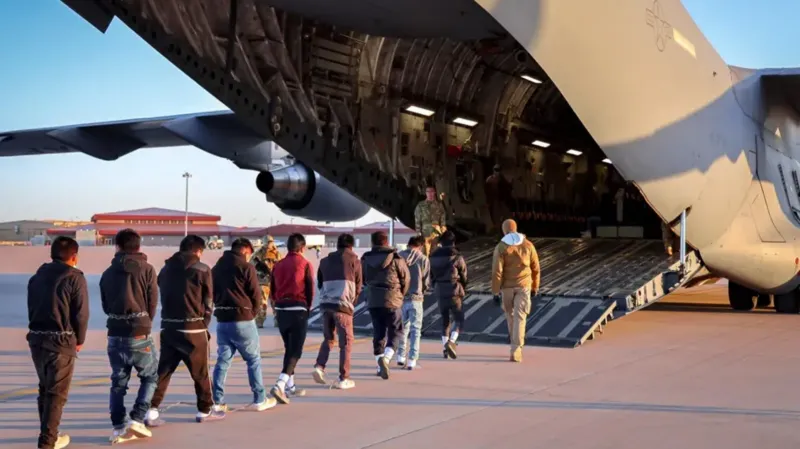Colombia backs down on deportation flights after Trump tariffs threat
The United States has decided not to impose tariffs on Colombia after the South American nation agreed to accept deported migrants without restrictions, the White House announced.
Former President Donald Trump had threatened a 25% tariff on all Colombian imports after Colombian President Gustavo Petro blocked two U.S. military deportation flights from landing on Sunday.
Petro initially stated that Colombia would only receive repatriated citizens on civilian flights to ensure they were not treated like criminals.
In a statement, the White House confirmed that Colombia has now agreed to accept deportees arriving on U.S. military aircraft “without limitation or delay.”
Colombia emphasized that dialogue with the U.S. would continue to “guarantee the dignity of our citizens.”
The White House framed the agreement as a success for Trump’s hard-line immigration policies, following a heated exchange of threats between the two leaders on social media.
Colombia’s foreign ministry later declared the impasse resolved just hours after Petro shared a lengthy post on X (formerly Twitter), condemning what he described as a U.S. “blockade.”
Petro had earlier barred U.S. military deportation flights, insisting that migrants should be returned “with dignity and respect.”
In response, Trump announced “urgent retaliatory measures,” including tariffs and visa restrictions, in a post on his Truth Social platform. Petro countered on X by proposing his own tariffs and celebrating Colombia’s cultural heritage.
The resolution highlights the contentious negotiations and the broader challenges of managing international migration and diplomatic relations.
“Your blockade does not scare me, because Colombia, besides being the country of beauty, is the heart of the world,” he said.
Within hours, the two sides appeared to have resolved the row, and the White House said Colombia had agreed to “all of President Trump’s demands”.
Trump’s proposed tariffs had been “fully drafted” and would still be implemented if Colombia does not honour this agreement, according to the White House.
Trump had also announced visa sanctions and enhanced inspections on Colombians at the border. These will remain in place “until the first planeload of Colombian deportees is successfully returned”, the White House said.
Colombia’s foreign minister Luis Gilberto Murillo said the country would “continue to receive Colombians who return as deportees, guaranteeing them decent conditions, as citizens subject to rights”.
Petro’s presidential plane has been prepared to facilitate the return of the Colombians who would have arrived in the country earlier on the blocked military flights, he added.
Murillo will travel to Washington for high-level meetings in the coming hours, according to a foreign ministry statement.
The feud between the two nations came after Trump’s administration vowed to carry out “mass deportations”. The president signed multiple executive orders related to immigration on his first day in office.
Some of Trump’s executive orders were signed with the aim of expanding Immigration and Customs Enforcement’s (ICE) ability to arrest and detain unlawful migrants on US soil.
Federal agents conducted “targeted” immigration arrests in Chicago on Sunday, an ICE spokesperson said in a statement.
The agents were accompanied by the newly appointed “border czar” Tom Homan, US officials told CBS News, the BBC’s US partner.
Homan said Congress should increase funding for the border effort, which included a need for 100,000 beds in migrant detention centres.
On Thursday, the US Congress passed the Laken Riley Act, which will greatly expand immigration authorities’ power to detain migrants.
Democratic congresswoman Alexandria Ocasio-Cortez said the bill represents a “fundamental erosion of civil rights”.


